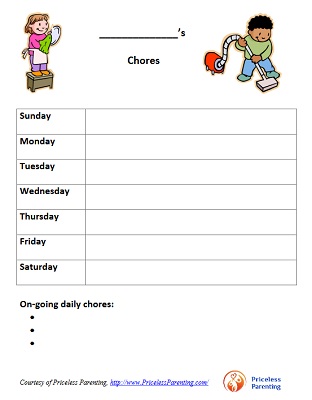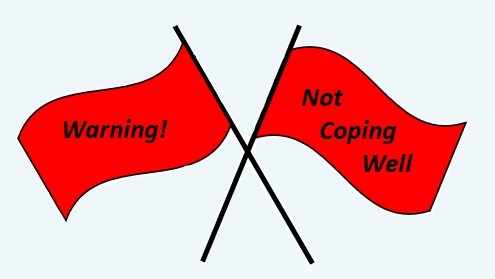Running a household involves plenty of work. How are your kids helping out? If they are preschool age or older they should have age-appropriate responsibilities.
Chores are a way for your children contribute to your family. It’s important for your kids to learn that being part of a family means helping with household tasks. You do not want your children growing up viewing you as their personal servant!
One parent wrote their biggest challenge is “keeping the house clean when the kids destroy it”. When kids make a mess they should be helping clean it up. Likewise, children who destroy something need to help replace or fix it.
Starting Chores Early
Start chores when your children are young and enthusiastic. Although preschoolers are not very good at chores, they are often eager to help. When you give your preschoolers simple chores, they are on the road to being significant contributors to your family.
Young children can handle tasks like picking up their toys, bringing in the mail and putting napkins and silverware on the table. You will need to teach your children how to do each task and help them out until they can do it on their own.
One mom said she is teaching her 5-year-old twins how to do the laundry. Although she still needs to provide some guidance, the boys are so proud they know what buttons to push and how to do a load of laundry!
Mastering new household skills builds self-confidence in children. It also builds appreciation for what needs to be done to keep the household running.
When my son was in elementary school one of his chores was washing the kitchen floor. We typically take our shoes off in the house but one day I kept my shoes on while carrying in some groceries. He asked me to take my shoes off because he had just finished cleaning the floor. Now that was music to my ears!
Choosing Chores
Begin by writing down all the tasks that need to be done to keep your family going. Include things like going to work to earn money, paying bills and providing rides. This list of chore ideas can help you get started.
(finish reading this article on PricelessParenting.com)
Red Flag Behaviors - Responding To Clues Kids Aren't Coping
Experiencing stress is part of growing up. What happens when children feel overwhelmed by stress? If your child is under age six, the result is often a tantrum. They aren’t trying to misbehave. They simply have not developed better coping skills.
Older kids may also have meltdowns when they are flooded with strong feelings. They are developing better coping skills but may not have the presence of mind to use those skills.
All kids experience stress. Some turn to talking to friends while others try escaping with drugs. How are your kids coping with their stress?
Developing Healthy Coping Strategies
Your kids may feel pressure to do well at school, sports and other activities. They also have various social pressures with classmates, friends and family.
Since all kids need to handle stress, developing healthy strategies is important. What do your kids like to do to calm down? Some healthy ways kids cope with stress include:
Recognizing Unhealthy Coping Behaviors
When your kids are overextended or exhausted, their coping skills may start to crumble. Even though they were coping well a few days ago, they may not be able to do it today.
Some behaviors indicate potentially serious problems in coping with stress. It’s natural to want to minimize the possible consequences and hope that things will get better. Don’t all teens act like this? Isn’t this a phase that will soon pass?
What behaviors may indicate a problem? Red flag behaviors include:
(finish reading article on PricelessParenting.com)
Older kids may also have meltdowns when they are flooded with strong feelings. They are developing better coping skills but may not have the presence of mind to use those skills.
All kids experience stress. Some turn to talking to friends while others try escaping with drugs. How are your kids coping with their stress?
Developing Healthy Coping Strategies
Your kids may feel pressure to do well at school, sports and other activities. They also have various social pressures with classmates, friends and family.
Since all kids need to handle stress, developing healthy strategies is important. What do your kids like to do to calm down? Some healthy ways kids cope with stress include:
- Drawing or coloring
- Listening to music
- Playing an instrument
- Meditating
- Talking to someone
- Exercising or going for a walk
- Writing in a journal
- Practicing a sport
- Reading
Recognizing Unhealthy Coping Behaviors
When your kids are overextended or exhausted, their coping skills may start to crumble. Even though they were coping well a few days ago, they may not be able to do it today.
Some behaviors indicate potentially serious problems in coping with stress. It’s natural to want to minimize the possible consequences and hope that things will get better. Don’t all teens act like this? Isn’t this a phase that will soon pass?
What behaviors may indicate a problem? Red flag behaviors include:
(finish reading article on PricelessParenting.com)
Subscribe to:
Comments (Atom)
Are your kids being targeted for sextortion?
Scammers are targeting kids for sextortion. They convince kids that nude pictures of them will be distributed to family, friends, classmate...

-
Susán Hoemke dreamt of a perfect family - a loving husband and four beautiful children. When their oldest son, Hayden, became addicted...
-
Is your teen presenting extremely challenging behavior? If you feel overwhelmed and unsure of how to help your teen, getting professional h...
-
Scammers are targeting kids for sextortion. They convince kids that nude pictures of them will be distributed to family, friends, classmate...

